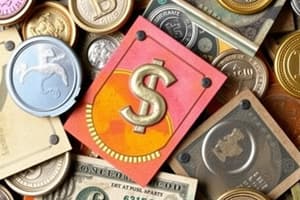Podcast
Questions and Answers
What is money?
What is money?
- A type of investment
- Only coins
- A unit of account (correct)
- Anything that serves as a medium of exchange (correct)
What does 'medium of exchange' refer to?
What does 'medium of exchange' refer to?
Anything that is used to determine value during the exchange of goods and services.
Define barter.
Define barter.
The direct exchange of one set of goods or services for another.
What does 'unit of account' mean?
What does 'unit of account' mean?
Describe 'store of value'.
Describe 'store of value'.
What is currency?
What is currency?
Define commodity money.
Define commodity money.
Illustrate representative money.
Illustrate representative money.
Explain fiat money.
Explain fiat money.
List the three uses of money.
List the three uses of money.
What are the six characteristics of money?
What are the six characteristics of money?
Define a bank.
Define a bank.
What is a national bank?
What is a national bank?
What does 'bank run' mean?
What does 'bank run' mean?
What is a greenback?
What is a greenback?
Explain the gold standard.
Explain the gold standard.
What is the Federal Reserve System?
What is the Federal Reserve System?
Define a central bank.
Define a central bank.
What is a member bank?
What is a member bank?
What is a Federal Reserve note?
What is a Federal Reserve note?
What was the Great Depression?
What was the Great Depression?
What is the Federal Deposit Insurance Corporation (FDIC)?
What is the Federal Deposit Insurance Corporation (FDIC)?
What is the purpose of The First Bank of the United States?
What is the purpose of The First Bank of the United States?
What characterized The Free Banking Era?
What characterized The Free Banking Era?
What were the National Banking Acts of 1863 & 1864?
What were the National Banking Acts of 1863 & 1864?
List the advantages of the gold standard.
List the advantages of the gold standard.
What were reasons for the S&L Crisis?
What were reasons for the S&L Crisis?
What is the Financial Institutions Reform, Recovery, and Enforcement Act (FIRREA)?
What is the Financial Institutions Reform, Recovery, and Enforcement Act (FIRREA)?
What is the money supply?
What is the money supply?
Define liquidity.
Define liquidity.
What is a demand deposit?
What is a demand deposit?
What is a money market mutual fund?
What is a money market mutual fund?
Explain fractional reserve banking.
Explain fractional reserve banking.
What is default?
What is default?
What is a mortgage?
What is a mortgage?
What is a credit card?
What is a credit card?
Define interest.
Define interest.
What is principal?
What is principal?
What is a debit card?
What is a debit card?
Define creditor.
Define creditor.
What does M1 represent?
What does M1 represent?
What does M2 consist of?
What does M2 consist of?
Examples of functions of financial institutions include _____.
Examples of functions of financial institutions include _____.
The four most common ways to save money are _____ and checking accounts.
The four most common ways to save money are _____ and checking accounts.
Types of financial institutions include _____ and saving banks.
Types of financial institutions include _____ and saving banks.
Flashcards are hidden until you start studying
Study Notes
Money and Its Functions
- Money acts as a medium of exchange, unit of account, and store of value.
- Medium of exchange facilitates trade by determining value during transactions.
- Barter is the direct exchange of goods and services without using money.
- Unit of account enables comparison of goods and services' values.
- Store of value maintains its worth when saved or stored.
Types of Money
- Currency includes coins and paper bills recognized as money.
- Commodity money has intrinsic value and is used as money (e.g., gold).
- Representative money can be exchanged for a commodity of value (e.g., gold-backed notes).
- Fiat money derives value from government mandate rather than intrinsic worth.
Characteristics of Money
- Durability: Must withstand physical wear and tear.
- Portability: Easily carried and transferred.
- Divisibility: Can be divided into smaller units.
- Uniformity: Same denomination has identical value.
- Limited supply: Should be scarce to maintain value.
- Acceptability: Widely recognized and accepted as a form of payment.
Banking Overview
- Banks are institutions for managing and lending money.
- National banks are licensed by the federal government.
- Bank runs occur when many customers withdraw funds simultaneously due to panic.
Historical Context
- Greenbacks were paper currency issued during the Civil War.
- The gold standard links currency value to a specified amount of gold.
- The Federal Reserve System is the central banking authority in the U.S.
- Central banks help stabilize the economy and lend to other banks.
Key Historical Institutions and Acts
- The Federal Deposit Insurance Corporation (FDIC) insures bank customer deposits.
- The First Bank of the United States was authorized to manage government funds and issue bank notes.
- The Free Banking Era experienced instability with bank runs and numerous currencies.
- The National Banking Acts of 1863 & 1864 established national currency and required banks to hold reserves.
Monetary Policy and Economic Crises
- The Great Depression was a significant economic downturn starting in 1929.
- The S&L Crisis arose from deregulation, high-interest rates, bad loans, and fraud.
- FIRREA aimed to address the issues within the savings and loan industry.
Money Supply and Liquidity
- The money supply encompasses all money available in the economy.
- Liquidity refers to how easily an asset can be converted to cash.
- Demand deposits represent money held in checking accounts, readily available.
Financial Instruments and Loans
- Money market mutual funds pool savings to invest in short-term securities.
- Fractional reserve banking keeps a fraction of deposits on hand and lends the rest.
- Mortgages are specific loans for purchasing real estate.
- Credit cards allow purchases based on the promise to pay later, while debit cards withdraw directly from accounts.
Interest and Financial Basics
- Interest is the cost of borrowing money expressed as a percentage.
- Principal is the initial amount borrowed.
- Types of financial institutions include commercial banks, credit unions, and finance companies.
Savings Methods
- Common savings vehicles include savings accounts, checking accounts, money market accounts, and certificates of deposits (CDs).
Studying That Suits You
Use AI to generate personalized quizzes and flashcards to suit your learning preferences.




